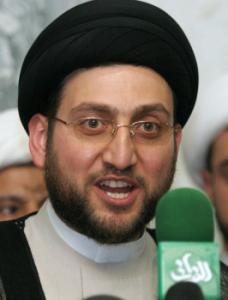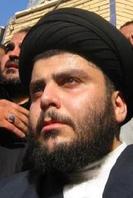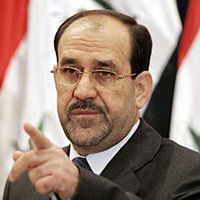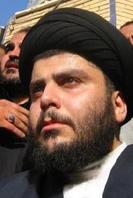The USG Open Source Center translates a guide to the main party coalitions in the March 7 elections in Iraq
Report Lists Main Iraqi Alliances Contesting Parliamentary Elections
Unattributed report: “List of [Iraqi] Political Alliances Before 2010 Elections”
Al-Hayah Online
Friday, March 5, 2010
Document Type: OSC Translated Text
Baghdad, Al-Hayah – . . .
 |
 |
|---|
The [Iraqi National Alliance] was announced on 24 August 2009 and includes 11 political entities, among them the most important Shiite parties which are the “…Islamic Supreme Council [of Iraq]” [ISCI}, “Badr Organization” [paramilitary of ISCI, organized to contest for vote], “Al-Sadr Trend”, “[Islamic Virtue] Al-Fadilah Party”, “Al-Da’wah Party-Iraq Organization”, “National Reform Trend” (Ibrahim al-Ja’fari), “Iraqi National Congress” (Ahmad Chalabi), Ibrahim Bahr-al-Ulum, and “Al-Wasat Trend” led by Muwaffaq al-Rubay’i in addition to Sunni forces, among them the “Muslim Ulema Group”, “Al-Anbar Salvation Council”, and liberal, secular and independent figures.
The [INA] is considered the main rival to the [State of Law] “SOL” which is led by Prime Minister Nuri al-Maliki. The [ISCI] and “Al-Sadr Trend” are hoping to regain some of the Shiite votes they had lost to Al-Maliki in the governorates councils’ elections last year. There are also speculations that the [INA] might forge an alliance with Al-Maliki’s alliance after the elections in case none of them obtains enough seats that allow it to form a government on its own. The “State of Law Coalition”

The “SOL” whose establishment was announced by Al-Maliki in October 2009 includes 50 political entities and a number of political and tribal figures, the most prominent of which are “Al-Da’wah Party General Headquarters” led by Al-Maliki, the “Islamic Turkoman Union” led by Deputy Abbas al-Bayyati, the “Mustaqillun [Independents’] Bloc” led by Oil Minister Husayn al-Shahrastani, and other groups which include some leaders of Sunni tribes, Christians, and independents. “SOL” was the biggest winner in the governorates councils’ elections in January 2009 after raising the slogan of imposing security, providing services, and establishing a strong central government. Al- Maliki considers his victory in the legislative elections “a certainty” with more votes than his rivals but he announced that he would be compelled to conclude alliances with other forces if he did not win a majority (163 seats) to form a government.
The “Iraqi National Movement”: This list includes the “National Accord Movement” which was announced on 31 October 2009 under Iyad Allawi, the “Iraqi Front for National Dialogue” led by Salih al-Mutlak (the two movement’s merger), Deputy Adnan Pachachi who is the former leader of the “Independent Democrats Grouping”, and Salam al-Zawba’i, the deputy prime minister who had resigned. Iraqi Deputy Prime Minister (title as published) Tariq al-Hashimi announced on 28 October 2009 that his “Tajdid” movement joined the “INM” which is seeking to contest the elections on the basis of a nationalist program.
The “INM” came under heavy pressures. The “Accountability and Justice Commission” banned some of its symbolic figures, most notably Salih al-Mutlak and Zafir al-Ani, from participating in the elections and the movement considered this an act of revenge and unconstitutional. Al-Mutlak announced his party would not contest the elections to protest his exclusion but later rescinded the decision and announced it would participate.
The “Iraqi Unity Movement”
It was announced on 21 November 2009 and includes around 26 political entities and various secular and Islamic forces and technocrats. The most prominent of them is Interior Minister Jawad al-Bulani, “Iraqi Al-Sahwah Council” leader Ahmad Abu-Rishah, the “Charter Grouping” led by Sunni Emoluments Council Chairman Shaykh Ahmad Abd-al-Ghafur al-Samarra’i, former Defense Minister Sa’dun al-Dulaymi, and “Iraqi Republican Grouping” led by Sa’d Asim al-Janabi.
Previous leaks pointed to understandings between Al-Bulani, Abu-Rishah, and Samarra’i with “INM” leaders Iyad Allawi, Tariq al-Hashimi, and Salih al-Mutlak in addition to former parliament Speaker Mahmud al-Mashhadani to form a large political front. But the widening of the front and disagreements over its leadership apparently aborted the idea in its cradle.
The Kurds

Four main Kurdish lists are competing in the elections. The two main Kurdish parties which control the Kurdistan Region in northern Iraq dominate the “Kurdish Alliance.” These are the “Kurdistan Democratic Party” led by Kurdish Prime Minister Mas’ud Barzani and the “Patriotic Union of Kurdistan” led by President Jalal Talabani. The two parties underline the Kurdish nationality and have strong relations with the West.
The two parties’ grip on the Kurdistan Region weakened before the “Change Bloc” led by Nushiran Mustafa who had split from Talabani and which called for reforms. It scored good results in last year’s Kurdish parliamentary elections and will contest this one alone. There is a fourth list, which is the “Islamic Kurdish Union” in addition to the “Islamic Group.”
Less important forces are contesting the elections, such as the Communist Party and the “National Unity Alliance” which includes a group of entities, most notably the “National Dialogue Council” led by Khalaf al-Alayan, “Asla” led by Fadil al-Maliki, “Ansar al-Risalah” led by Mazin Makkiyah, and the liberal “Al-Ahrar” led by Deputy Iyad Jamal-al-Din. The Tribal Chiefs
Tribal chiefs play an important role in the elections and the main parties are seeking to curry their favor. Some leaders of Sunni tribes became prominent when the US forces started to back the “Awakening Councils” against “Al-Qa’ida” gunmen in 2006. Though the prominent tribal figures were eager to engage in political activity, they did not however establish a united front but joined existing blocs. The minorities
Iraq’s smaller minorities in Iraq include the Turkoman, Christians, Yazidis, Sabians, and Al-Shabak. They are allied to larger electoral lists in areas they do not dominate.
(Description of Source: London Al-Hayah Online in Arabic — Website of influential Saudi-owned London pan-Arab daily…)
End/ (Not Continued)



 © 2026 All Rights Reserved
© 2026 All Rights Reserved